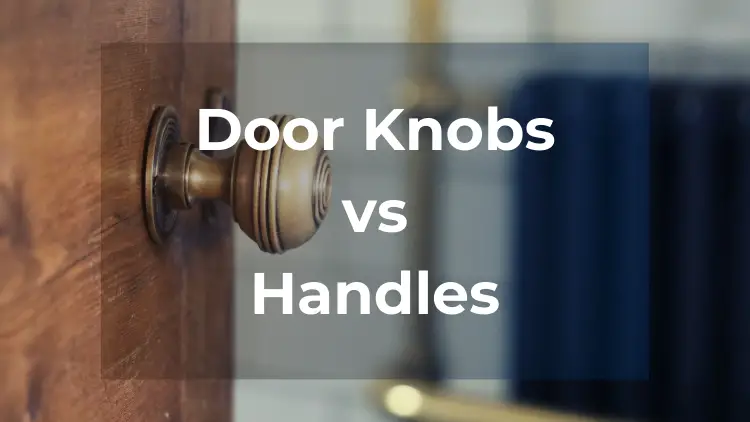If you’re looking to update your home’s interior or exterior doors, you might be wondering whether to choose door knobs or handles.
Both options have their advantages and disadvantages, and the best one for you depends on your personal taste, budget, and needs.
In this article, I’ll provide an in-depth comparison of door knobs versus handles to help you make an informed decision. We’ll cover the main differences between them, the important factors to consider when choosing, and some recommendations based on different home styles and needs.
The Main Differences Between Door Knobs and Handles
Door knobs and handles are the two most common types of door hardware that you’ll find in most homes.
They differ in several aspects, such as:
- Appearance: Door knobs are more decorative and ornamental, while handles are more modern and simplistic. Door knobs come in a variety of shapes, sizes, and styles, from round to oval, from glass to brass, from vintage to contemporary. Handles, on the other hand, are usually straight or curved, and have fewer design options. Levers tend to blend in with the door, while knobs stand out as a focal point.
- Operation: Door knobs require you to fully grip and turn them to open or close the door, while handles allow you to pull down or lift up with your wrist or arm. This means that knobs are more suitable for doors that need to be locked or unlocked frequently, such as bedrooms or bathrooms, while levers are more convenient for doors that are used more often, such as closets or pantries.
- Accessibility: Handles are easier to operate for people who have disabilities, arthritis, or limited hand strength, as well as for people who have their hands full with groceries, bags, or children. Knobs can be difficult or painful to turn for some people, and they require a free hand to use. Handles can also be opened with an elbow, a foot, or even a shoulder, making them more accessible and versatile.
- Security: Knobs provide extra protection against intruders, as they are harder to force open with tools or brute strength. Handles, especially levers, can be easily pushed down or lifted up with a crowbar, a screwdriver, or even a credit card. Knobs are also more resistant to picking, bumping, or drilling, as they have more complex locking mechanisms. Handles are more vulnerable to these methods, as they have simpler latches.
| Door Knob | Door Handle | |
| Style | Decorative, traditional | Modern, sleek |
| Ease of Use | Requires full grip and twist | Simply pull down or lift up |
| Accessibility | Difficult for some | Very easy to operate |
| Durability | More durable | Less durable |
| Security | More secure | Less secure |
Important Factors to Consider When Choosing Door Hardware
When deciding between door knobs and handles, you should consider the following factors:
Aesthetic

The style and appearance of your door hardware should match the overall décor and theme of your home.
You should also consider the finish and color of your hardware, and how it complements the door and the surrounding walls.
For example, if you have a traditional or rustic home, you might prefer door knobs with a bronze or copper finish, while if you have a modern or minimalist home, you might opt for handles with a chrome or stainless steel finish.
Room function
The function and purpose of the room where the door is located should also influence your choice of hardware.
For rooms that have higher traffic or usage, such as kitchens, living rooms, or hallways, you might benefit from handles that are easy and quick to operate.
For rooms that require more privacy or security, such as bedrooms, bathrooms, or offices, you might prefer knobs that offer more control and protection.
Durability
The quality and durability of your door hardware should also be taken into account, as you want it to last for a long time and withstand wear and tear.
Generally, knobs tend to be more durable and long-lasting than handles, as they are made of sturdier materials, such as porcelain, metal, or wood. Handles, especially those made of plastic or resin, can break or crack more easily, and they can also loosen or sag over time.
Accessibility needs
If you or someone in your household has special accessibility needs, such as being elderly, disabled, or having mobility issues, you should choose door hardware that is easy and comfortable to use.
Handles are usually more accessible and user-friendly than knobs, as they require less force and effort to operate.
Knobs can be challenging or impossible to use for some people, especially those who have arthritis, dexterity problems, or hand injuries.
Handles can also be more convenient for children, as they can reach and operate them more easily than knobs.
Safety
Another factor to consider is the safety and emergency preparedness of your door hardware.
Handles provide more leverage and force in case you need to exit quickly or forcefully, such as in a fire or a break-in.
Knobs can be harder to turn or open in a hurry, especially if they are locked or jammed.
Some building codes and regulations require levers or handles in new homes or public buildings for accessibility and safety reasons, so you should check your local laws before installing knobs.
Personal preference
Ultimately, the best choice of door hardware for your home is the one that suits your personal preference and comfort.
You should choose the option that you like the most, that fits your budget, and that makes your daily life easier and more enjoyable. You can also mix and match different types of door knobs and handles for different doors, depending on your needs and tastes.
The Pros and Cons of Door Knobs
The Pros
- Highly secure design deters break-ins
- Widened variety of decorative styles to elevate room designs
- Quality materials like solid brass, porcelain, and crystal provide lasting durability
- Allows full hand control over opening/closing a door
The Cons
- Difficult for some children or those with arthritis/mobility issues to operate
- Must grasp and turn – not hands-free
- Ornate styles less suited for contemporary homes
Do you want to learn more about how door knobs work? Find out everything you need to know in our illustrated guide on the different parts of door knobs.
The Pros and Cons of Door Handles
The Pros
- Convenient to open doors with arm/wrist vs whole hand
- Levers are accessible for kids and elderly
- Easy to operate with hands full
- Match a modern, minimalist aesthetic
The Cons
- Can sometimes be forced open by those attempting to break in
- Prone to mechanical issues like loose screws or failing springs
- Less selection of attractive, decorative handle designs
- Easily opened by clever pets, especially cats
- Young kids can also figure out how to work levers, bypassing childproofing efforts
Conclusion
Choosing between door knobs and handles can be a tricky decision, as both options have their pros and cons. The best one for you depends on several factors, such as your home style, room function, durability, accessibility, safety, and personal preference. You should weigh the advantages and disadvantages of each option, and consider your needs and tastes. You can also consult a professional or a reputable hardware store for more advice and guidance.
We hope this article has helped you understand the differences between door knobs and handles, and how to pick the right one for your home. If you have any questions or comments, please feel free to leave them below. We’d love to hear from you!











